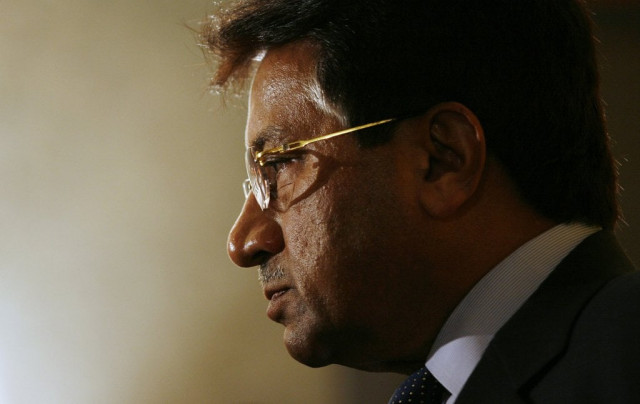Musharraf treason case: It’ll be a regular criminal case, say experts
SC can refer this case to any trial court or can order formation of a special tribunal or bench of any high court.

Pervez Musharraf. PHOTO: REUTERS/FILE
While the government has decided to try former army chief and president Pervez Musharraf for high treason, many people wonder what will be the mode of his trial.
It’ll not be much different from the Benazir Bhutto assassination case, say legal experts.
“The state is a party in this case, like many other criminal cases, where FIR is filed. The Supreme Court can refer this case to any trial court or can order formation of a special tribunal or bench of any high court,” says senior lawyer Sardar Ishaq. “Such criminal cases are usually heard by two judges.”
In this case the federal government would have to follow the criminal procedure by submitting a challan, producing witnesses and documentary proofs against the accused (Musharraf) before the trial court, Ishaq adds.
The procedure under the High Treason (Punishment) Act, 1973 states that “no court shall take cognisance of an offence punishable under this act except upon a complaint in writing made by a person authorised by the federal government in this behalf”.
However, according to the current scheme for this specific case, the interior secretary will become the complainant.
Constitutional law expert Abid Minto says that like any criminal case the trial procedure is very simple and in this case the relevant law will be followed.
Referring to some media reports, he says confusion is being spread about the mode of the trial as this case is the first of its kind.
Minto says the procedure is clearly mentioned in Article 6 of the Constitution: “(1) Any person who abrogates or subverts or suspends or holds in abeyance or attempts or conspires to abrogate or subvert or suspend or hold in abeyance the Constitution by rules of force or show of force or by any other unconstitutional means shall be guilty of high treason”.
Article 6 further states: “Any person aiding or abetting [or collaborating] the acts mentioned in clause (1) shall likewise be guilty of high treason. Clause 2A of the article says that an act of high treason mentioned in Clause (1) or Clause (2) shall not be validated by any court including the Supreme Court or High Court. Clause of the article says [Majlis-e-Shoora (Parliament)] shall by law provide for the punishment of persons found guilty of high treason.
Published in The Express Tribune, June 25th, 2013.



















COMMENTS
Comments are moderated and generally will be posted if they are on-topic and not abusive.
For more information, please see our Comments FAQ